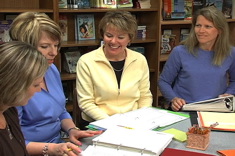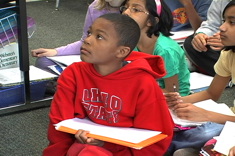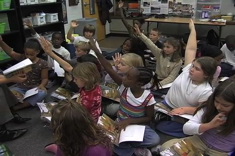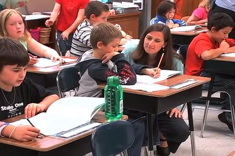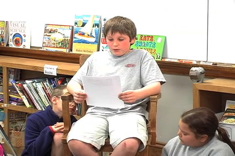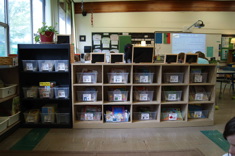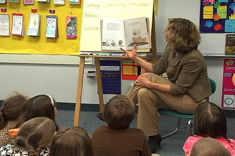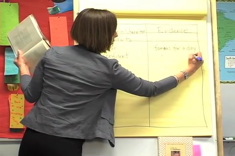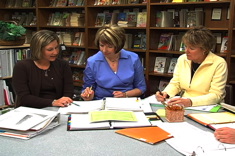Literacy Coaches
A simple question - who will coach the coaches? If you're a literacy coach, you already know there is no job more amazing or overwhelming in a school. Our Choice Literacy library includes a small sample of our resources for literacy coaches. If you work as a coach, you'll want a subscription that includes access to our Leaders Lounge, where there are over 900 resources for coaches, including study group protocols, videos of demonstration lessons, and guides for designing coaching cycles.
Latest Content
What’s the Evidence?
Heather Rader shares her experiences working with a teacher team led by an outspoken leader. With listening and support, the team examines evidence in a new way.
Working with Adults: Structuring Effective Conferring
Amanda Adrian connects new learning as a runner to her work with teachers around reading conferences, and shares a model that works.
Preserving Student Writing as a Curator
Once students are producing quality writing, there is a new challenge: what to do with it all? Heather Rader works with a teacher to design a system to meet her needs.
Trying to Coach Without the Budget in Mind
Melanie Quinn makes a somewhat surprising discovery in the midst of the budget cutting season. The best way to justify her literacy coaching position is to do less – but do everything extraordinarily well.
Keeping It Real for Students: Never Underestimate the Power of Reflection
Melanie Quinn consoles a teacher who is recovering from a disastrous lesson captured on video, and shows the power of a “do-over” for both teachers and students.
Learning from Master Teachers: It’s the Process, Not the Content (Part I)
Have you ever wondered why lessons you attempt to imitate from master teachers you’ve seen on videos often go poorly? Franki Sibberson asked herself this question after trying a minilesson she viewed from Debbie Miller. She discovered it’s what comes before the lesson that matters more than what’s in the lesson.
Communicating with the Y Chromosome
Heather Rader finds herself coaching a male teacher who is part of a male teaching team, and gets a lesson herself in gender communication patterns.
Katherine Casey on Sharing Blunders with Colleagues (PODCAST)
Katherine Casey explains why she shares her teaching blunders (on video, no less) with colleagues, and what she has learned from the process.
The Superpower of Reflecting
Are you more of a Pollyanna or Eeyore reflector? Heather Rader takes you inside the questions that help us reflect even more deeply on our instructional practices.
Simplexity: Finding Your Focus
Jennifer Allen visits a thriving cupcake store in Boston that doesn’t sell any cupcakes. It turns out to be the perfect example of “simplexity” – Michael Fullan’s term for maintaining focus on goals and a larger purpose. Jennifer writes about how simplexity applies to professional development planning for literacy leaders.
The Power of Checklists in Primary Literacy Workshops
Knowing our most sophisticated professions use checklists to get it right, Clare Landrigan and Tammy Mulligan share and explain checklists that work well for students.
Off the Dance Floor and Onto the Balcony: Getting the Big Picture in Schools
In the day-to-day triage of our schools and the sense of urgency that pushes us to always be accountable for every minute of the day, it is understandable that we tend to forget to pause to think about our larger goals. No one wants to “waste time.” This activity helps everyone keep the big picture in mind.
Putting the “Mini” Back in Minilessons
We know that the shorter our minilesson, the more time students will have to read and write, but it's not easy for many of us. Shari Frost has tips to shape up minilessons that have become maxilessons.
A Bad Case of the Never-Ending Januaries
With a tough winter and tougher budget prospects, many schools will be dealing with the Januaries straight through March. Our contributors have suggestions for dealing with stress, fatigue, and depression to help renew and re-energize your work.
Keeping Students Front and Center
Jennifer Allen realizes that her biggest fear as a literacy coach is forgetting to keep students at the heart of our coaching conversations. With this in mind, she shares what keeps student learning as her primary focus.
Sense of Little Engines
Heather Rader writes about "agency" – the challenge of letting students and teachers take charge of their learning. In concrete examples from a third-grade classroom and a professional development scoring session with teachers, Heather shares the subtleties of learning to trust, wait, and celebrate when learners of any age are responsible and independent.
A Class with More Boys Than Girls
Heather Rader coaches a teacher who considers her boy/girl ratio and how it may be affecting students' understanding of directions and time on task.
Clare Landrigan and Tammy Mulligan on Getting the Most Out of Grade-Level Team Meetings (PODCAST)
In this podcast, Clare Landrigan and Tammy Mulligan, the founders of Teachers for Teachers, talk with Franki Sibberson about how to link grade level team meetings with student achievement, and build stronger teaching communities at the same time.
Acquiring Knowledge Two or Three Strategies at a Time
Amanda Adrian knows that a teachers learning new skills need accurate and timely identification of what's next as support.
What’s Good for the Goslings is Good for the Geese: Parallels Between Scaffolding Student Learning and Scaffolding Staff Development
Terry Thompson considers the concept of “scaffolding” for both student learning and professional development.
Books with Overlooked Potential for Launching the School Year (and Ideas for Using Them with Students)
You know those books that cause us to say, “Aww…I love that book.” Well, the team at Literacyhead has us thinking about using old favorites in new ways.
Walk Arounds: Gathering Data to Test Assumptions
Do you have a tattler in your midst? Not a child, but a teacher complaining about the work habits of a colleague? Jennifer Jones explains her proactive use of walk-arounds to gather data and confront misconceptions.
How to Look at Student Work
With summaries as an example, Heather Rader uses trends from learners to help make smart instructional decisions about what is presented during whole group, small group and individual time.
Coaching for the Test
Two teachers are disappointed in student assessment results, but they have very different approaches to tackling the problem. Heather Rader shares her role as a mentor in assisting her colleagues.
Favorite Short Mentor Texts for Demonstration Lessons
For teacher leaders who are called upon to do demonstration lessons, here is a “must-have” list of short, potent books.
Coaching Monkey
Heather Rader has advice for literacy coaches looking for honest appraisals of their work from colleagues.
A Closer Look at Anchor Charts
Shari Frost has a gift for helping us think about purpose and this article is no exception as she turns her attention to the benefits of intentional anchor charts.
Tips from Literacy Leaders for Closing Out the School Year (ROUND-UP)
Here are some suggestions from Choice Literacy Contributors of the best ways to close out the year, with everything from personal organizing tips to family events.
Lesson Structure: Building a Strong Foundation
Stepping back to think about the design of quality instruction is essential for any teacher. Heather Rader looks to brain research and tried-and-true practices to lay out lesson components.
Writing Drafts and Stamina
Stamina is a term we use often in literacy instruction, but it can be tricky for students and teachers to define in classroom contexts. Heather Rader looks at the specific attributes of writing stamina, as well as how to model it for students.
Browse Content By
Type
Category
- Assessment Tools
- Big Fresh Archives
- Booklists
- Choice Numeracy
- Classroom Design
- Common Core
- Community Building
- Conferring
- Content Literacy
- Digital Literacy
- English Language Learners
- Equity
- Family Relations
- Free Samples
- Guiding Groups
- Leadership
- Literacy Coaches
- Mentor Texts
- Minilessons
- New Teacher Mentors
- Podcasts
- Poetry
- Quote Collections
- Reading Strategies
- Self Care
- Struggling and Striving Learners
- Talking and Listening
- Teacher Study Groups
- Teaching Reading
- Teaching Writing
- Word Study and Vocabulary
Author
- Melissa Quimby
- Nawal Qarooni
- Gwen Blumberg
- Julie Cox
- The Lead Learners
- Hannah Tills
- Josie Stewart
- Ruth Metcalfe
- Mallory Messenger
- Becca Burk
- Jodie Bailey
- Vivian Chen
- Mary Brower
- Tiffany Abbott Fuller
- Stephanie Affinito
- Ruth Ayres
- Leigh Anne Eck
- Heather Fisher
- Shari Frost
- Julie Johnson
- Suzy Kaback
- Gigi McAllister
- Shirl McPhillips
- Melanie Meehan
- Cathy Mere
- Debbie Miller
- Tara Barnett and Kate Mills
- Tammy Mulligan
- Dana Murphy
- Bitsy Parks
- David Pittman
- Brenda Power
- Heather Rader
- Matt Renwick
- Mandy Robek
- Christy Rush-Levine
- Gretchen Schroeder
- Jen Schwanke
- Brian Sepe
- Katherine Sokolowski
- Stella Villalba
- Jennifer Vincent
Grade Level
Choice Literacy Membership
Articles
Get full access to all Choice Literacy article content
Videos
Get full access to all Choice Literacy video content
Courses
Access Choice Literacy course curriculum and training


